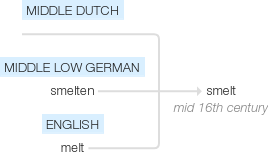Smelt
mid 16th century: from Middle Dutch, Middle Low German smelten ; related to the verb melt.
wiktionary
From Middle English smelt, from Old English smelt, from Proto-Germanic *smeltaz.
From very early Middle English smel; likely to derive from Old English, but not recorded.
From Middle Dutch smelten(“to melt”) or Middle Low German smelten(“to melt”), both from Proto-Germanic *smeltaną(“to melt”). Related to English melt and Old English meltan(“to melt”). Cognate to Dutch smelten, German schmelzen.
etymonline
smelt (v.)
mid-15c. (implied in smelter), from Dutch or Low German smelten, from Proto-Germanic *smelt- (source also of Old High German smelzan, German schmelzen "to melt"), from PIE *smeld-, variant of PIE root *mel- (1) "soft." Thus the word is related to melt (v.). Related: Smelted; smelting.
smelt (n.)
Old English smelt "sardine, small salmon-like sea fish," cognate with Dutch smelt "sand eel," Danish smelt (c. 1600). OED notes that it has a peculiar odor (but doesn't suggest a connection with smell); Klein suggests a connection with the way the fish melts in one's mouth. Century Dictionary speculates it means "smooth" and compares Old English smeolt, smylt "serene, smooth." Watkins says from PIE root *mel- (1) "soft."
